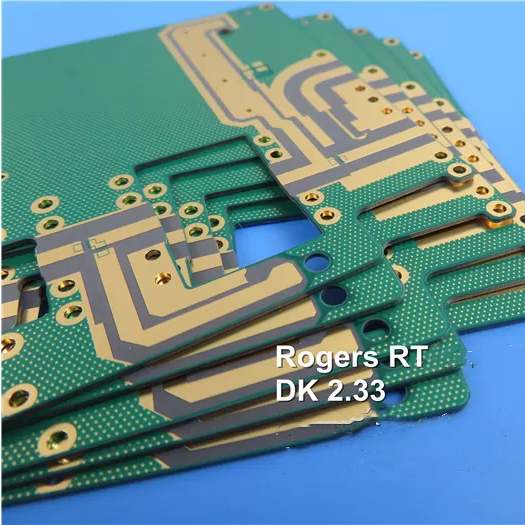Overview
The RO4400TM/RO4400TTM series bondply from Rogers Corporation is a high performance laminate material designed for use in bonding applications. This versatile material offers several key benefits that make it suitable for aerospace, defense, telecom, and other demanding applications.
Key Features
- Excellent dielectric properties
- Very low loss
- High bond strength
- Good dimensional stability
- Easily machined
- Flame resistant versions available
RO4400TM/RO4400TTM bondply consists of Rogers 4000 series thermoset laminate bonded to either one or two sides of a woven glass fabric core. The thermoset laminate surfaces provide excellent adhesion and bond strength while the interior glass fabric adds mechanical stability.
Applications

The RO4400TM/RO4400TTM series has been used in a wide variety of bonding applications including:
- Multilayer PCBs
- Microwave antennas
- Radomes and arrays
- EMI/RFI shielding
- Aerospace structures
- Ballistic composites
The material’s combination of electrical and mechanical properties makes it suitable for bonding dissimilar materials like plastics, metals, ceramics, and other composites. The flame resistant versions meet UL 94 V-0 requirements for low smoke and flame spread.
Available Configurations
The RO4400TM/RO4400TTM series is available in several standard configurations:
| Part Number | Description |
|---|---|
| RO4400TM | RO4000 thermoset on 1 side of 0.004″ glass fabric |
| RO4400TTM | RO4000 thermoset on 2 sides of 0.004″ glass fabric |
| RO4450TTM | RO4000 thermoset on 2 sides of 0.0075″ glass fabric |
| RO4450JTM | RO4000 thermoset on 2 sides of 0.0075″ quartz fabric |
Standard panel size is 18 x 24 inches but custom sizes and configurations are available on request. The thermoset laminate layer is typically 0.002″, 0.003″, or 0.005″ thick.
Properties
RO4400TM/RO4400TTM bondply offers exceptional electrical and mechanical properties:
| Property | Typical Value | Test Method |
|---|---|---|
| Dielectric Constant (10 GHz) | 3.3 | IPC-TM-650 2.5.5.3 |
| Loss Tangent (10 GHz) | 0.0027 | IPC-TM-650 2.5.5.3 |
| Bond Strength | >5 lbs/inch | |
| Peel Strength | >5 lbs/inch | |
| Flex Strength | >175 Kpsi | IPC-TM-650 2.4.3.2 |
| Density | 1.9 g/cc | ASTM D792 |
| Flammability | V-0 | UL 94 |
Processing
The RO4400TM/RO4400TTM series can be machined, punched, and routed using carbide tooling. It bonds well with epoxy, cyanate ester, bismaleimide, polyimide, and other adhesives. The material is also compatible with common PCB plating and coating processes.
Prepregs can be supplied for customers who wish to produce multilayer PCBs or components from RO4400TM/RO4400TTM bondply.
Frequently Asked Questions
Here are answers to some common questions about the RO4400TM/RO4400TTM series bondply:
What is the typical bond strength?
The typical adhesive bond strength exceeds 5 lbs/inch. Strong epoxy bonds generally delaminate the glass fabric before failing.
What are the key advantages over FR-4 bonding?
RO4400TM bondply has lower loss, better stability, better adhesive bonds, and lower smoke/flame properties than typical FR-4 bonding materials.
What type of adhesive works best?
Epoxy film and paste adhesives generally provide the best performance. Rogers can recommend compatible adhesives.
Can RO4400TTM be used for multilayer boards?
Yes, RO4400TTM prepregs are available for producing multilayer boards using standard PCB processes.
What are some example applications?
Common uses include bonding heat sinks and baseplates, patch antennas, radomes, electroformed housings, and EMI/RFI shields. Flex circuits, rigid-flex, and multilayer PCBs also utilize RO4400TM/RO4400TTM bondply.

Leave a Reply